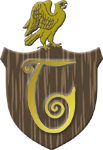
P.O. Box 1333
Merchantville NJ 08109, USA
Email: info@arxpub.com
 |
Arx
Publishing, LLC P.O. Box 1333 Merchantville NJ 08109, USA Email: info@arxpub.com |
|
|
|
||

Excerpt from Niamh and the Hermit
By Emily C. A. Snyder
“My dearest cousin,” wrote he, “how glad am I to receive word from thee, since last we spoke was too long ago. I lament, even now, the misfortunes thou suffered at our fallen cousin’s hand—although how well I wont thy present happiness. It is a selfish lament, I concede. When once thou wert full one of us, I mean, with thy wings, how much more quickly such matters as these might be resolved! For thou mightest have flown to me, then, and so inquired over nectar and ambrosia, but thou hast chosen a mortal path, and so I fumble with mortal pen and mortal parchment, and spill the ink like footprints.
“In the question put to me, I reply in fashion suitable to a Fae. Yea, I know the man after whom thou seekest. But on his past, I shall not speak. It is as dark as it is mysterious, and shalt come to light in given time, God willing. (Sure! And I must be out of practice to mangle my prophecies so!) As to his character, for that I will doubly vouch and more. But hear me now: as thou lovest thy daughter, do not delay in sending for the Hermit. Nor delay their marriage by courtship, or even by an hour, lest they never marry, and thy proud line dieth with thee.
“Alas that I cannot think to end this note on hilarity, as I am wont to do. Thy concern, Rhianna, is the concern of us all. But be thou assured, that shouldst thou or any who calleth on thy name approach me for aid, I shall readily give it, though it cost me all I am.”